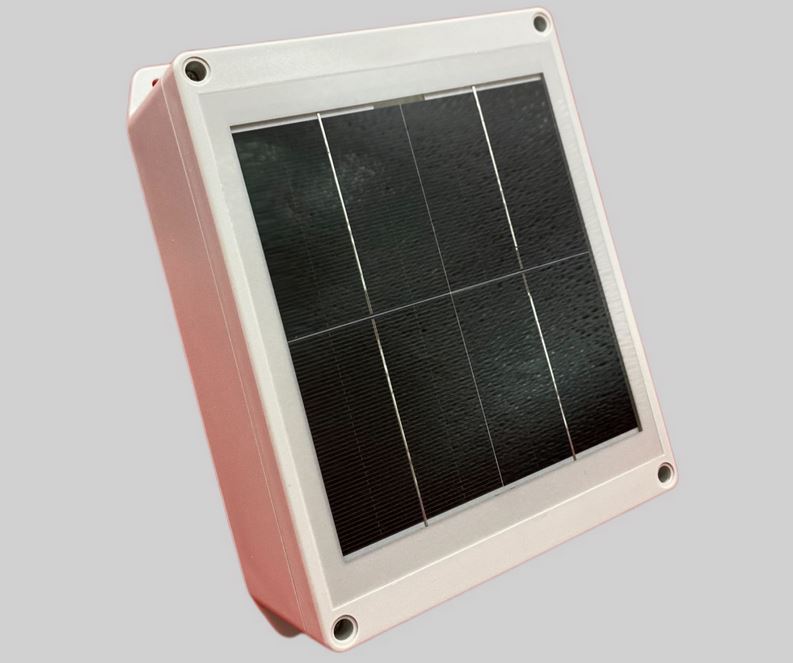Flexwave, a Taiwan-based developer of PV solutions for indoor-outdoor applications, has launched a solar PV unit intended to provide 10 years of self-sustaining solar power to remote small-sized electronics devices, such as wildfire detectors or gas monitors, as well as to Internet of Things (IoT) applications.
Dubbed Arc-Solar Box, the monocrystalline module relies on passivated emitter rear contact (PERC) cell technology and is available in two versions with a power output of 1,250 mW and 3,050 mW, respectively.
The smallest device is embedded in an enclosure that measures 166 mm x 86 mm x 55 mm and hosts a PV module with a size of 110 mm x 60 mm. The larger version has an enclosure measuring 187 mm x 147 mm x 75 mm and contains a solar panel with dimensions of 134 mm x 104 mm.
The enclosure utilizes a waveguide technology that does not rely on conventional encapsulation, such as ethylene vinyl acetate (EVA). “We use an optical encapsulant to substitute the traditional Glass/EVA, which shows good waveguide behavior and helps to collect the light from wider angles, just like a concentrator,” Daniel Chou, CEO, told pv magazine.
It also features maximum power point tracking (MPPT) and a charge control system that reportedly enables 10,000 mWh on a sunny day and 980 mWh on a cloudy day, based on measurements made in Hsinchu, Taiwan.
Furthermore, it has IP67 protection and includes a 5.0 V solar charge/battery controller. Optional features include a terrestrial and satellite communications module, environmental sensors, a rechargeable battery, and asset-tracking packaging.
The Flexwave technology is purportedly suitable for other cell technologies, such as organic photovoltaics (OPV), dye-sensitized solar cells (DSSC), and gallium arsenide (GaAs) cells.
In February, the Flexwave module was validated with 14.48% efficiency under LED and 19.44% under a fluorescent lamp (TL84), by Taiwan's Industrial Technology Research Institute (ITRI).
Referring to a study presented in September at the EU PVSEC event in Portugal that relied on a Real-Time One-Sweep (RTOS) method for I-V measurements and an indoor lighting simulator, Chou said, “With our technology, a mono-Si module could reach over 20% efficiency under fluorescent lamp for the very first time.”
The ArcBox is one of several original development manufacturing (ODM) products from the Taiwanese startup. It also offers a developer kit, Micro-EH, to original equipment manufacturers (OEM) for evaluation and prototyping. “The test kit helps our customers to understand the works of energy harvesters and quickly evaluate their system,” said Chou.
Design-in wins include the geo-location and user-access consoles in bicycles belonging to a leading Taiwanese bike-sharing fleet and the power modules inside Taiwan-based GlobalSat Worldcom’s GPS and terrestrial low range livestock asset trackers.
“As a young company, we keep looking for business that can solve problems and make profit, IoTs and distributed electronics are the major targets,” said Chou. “Although most of our business is ODM, more business connections on distribution will be welcome.”
This content is protected by copyright and may not be reused. If you want to cooperate with us and would like to reuse some of our content, please contact: editors@pv-magazine.com.



By submitting this form you agree to pv magazine using your data for the purposes of publishing your comment.
Your personal data will only be disclosed or otherwise transmitted to third parties for the purposes of spam filtering or if this is necessary for technical maintenance of the website. Any other transfer to third parties will not take place unless this is justified on the basis of applicable data protection regulations or if pv magazine is legally obliged to do so.
You may revoke this consent at any time with effect for the future, in which case your personal data will be deleted immediately. Otherwise, your data will be deleted if pv magazine has processed your request or the purpose of data storage is fulfilled.
Further information on data privacy can be found in our Data Protection Policy.